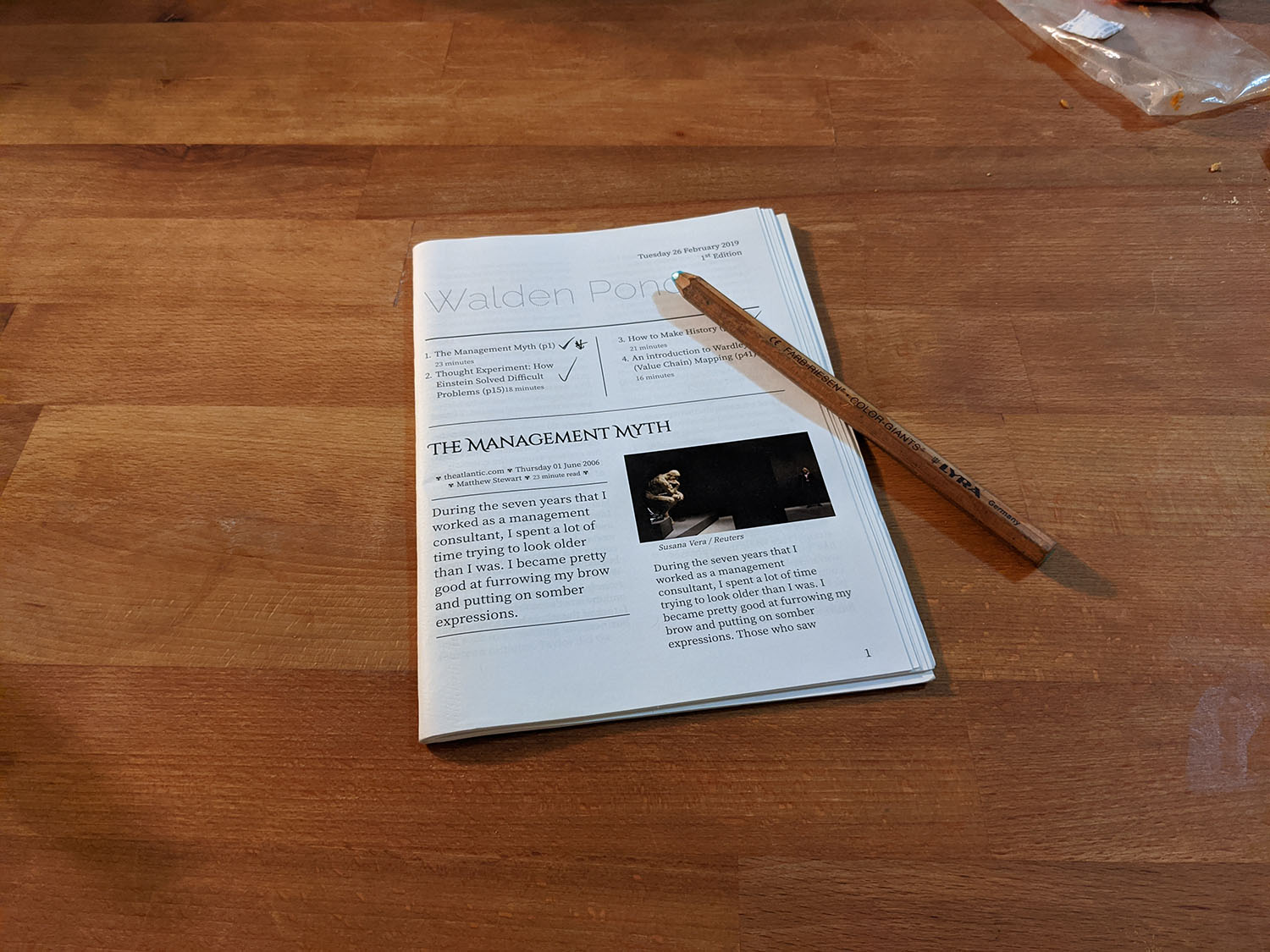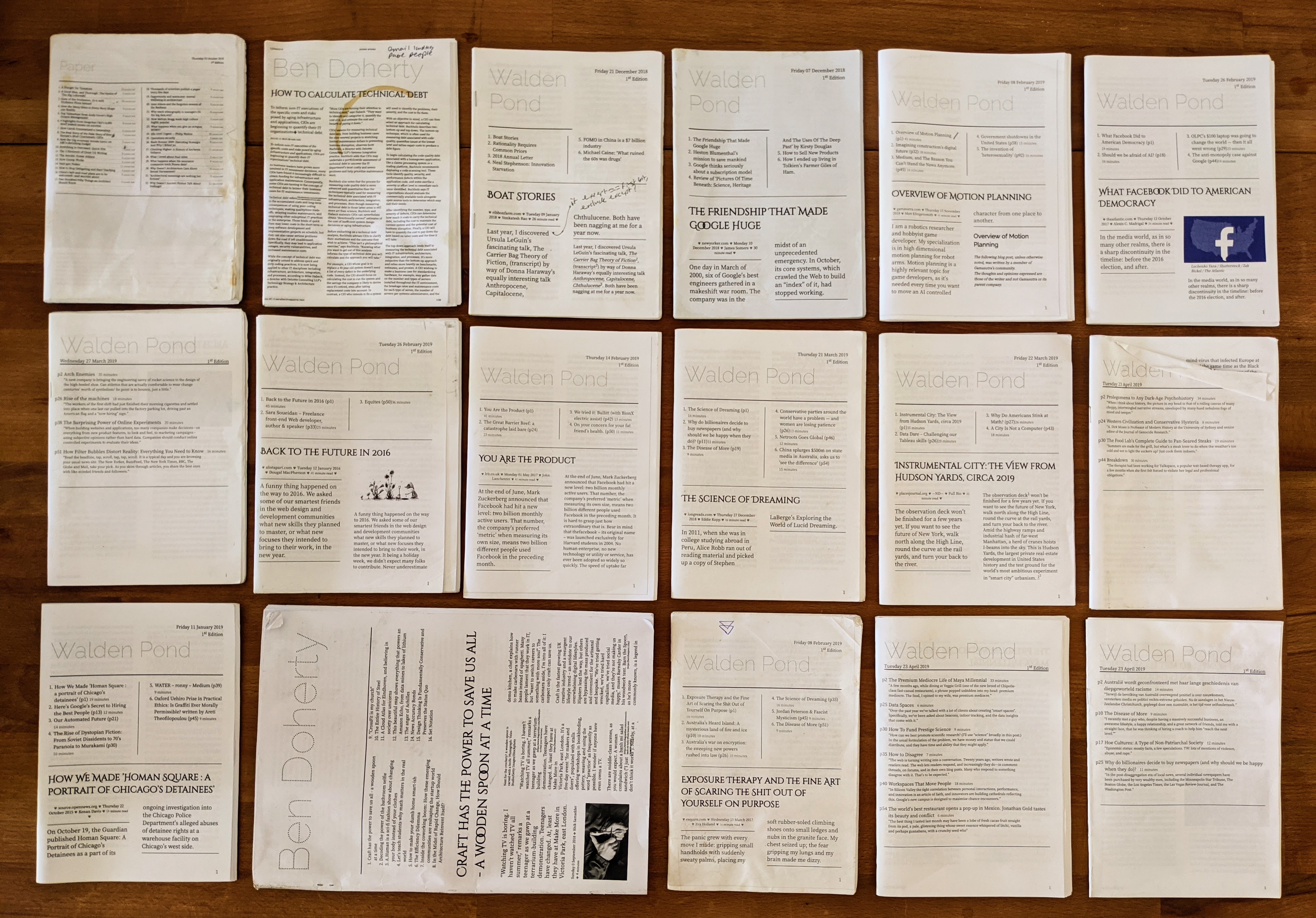Introducing Walden Pond
There are a lot of interesting articles online, and so little spare attention to read them. The Walden Pond zine is my way of fixing that. I thought it would be worth sharing that with other people too, so you can subscribe to Walden Pond yourself now. If you’re interested in how it works around the back, I’ll be doing a post on that soon.

One of the prototype editions, on my messy kitchen table. Reading with a pen in my hand feels different to reading on a screen; I like it.
What problem are we solving?
When I’m working, I constantly come across interesting articles. My ADD is like a naughty dog, at the slightest provocation it pulls my brain off track and onto something else, so I need a strategy to keep it going in the same direction as I’d like to go. At the same time, I don’t want to deny myself the ability to read all this interesting stuff because then my life will be boring.
Tate; from Survival (1983–85), 1985; ©1985 Jenny Holzer, member Artists Rights Society (ARS), NY; Photo: John Marchael
I need a way to store all the interesting stuff I come across, so when I’m not trying to focus on something I can pull them out and expand my mind.
That’s problem 1, and there’s a fantastic solution to that, Pocket, but problem 2 has the same root cause: difficulty in controlling my attention. It’s all very well having all these interesting articles, but I get distracted from reading them to do other things1.
How does Walden Pond solve those problems?
Problem one is easy, you just save the interesting article to Pocket and come back to it later. It’s a habit that took me a while to build, but it’s automatic now.
Problem 2 is harder, how do I protect myself from the ravages of notifications on my phone or from the “oh, this idea is hard, I wonder what’s on Twitter?” thought loop?
I think the answer is selective Waldenponding. The idea is that you carve out some distraction free time, an unplugged hour, but then you throw yourself headlong back into the melee.
Walden Pond is a little magazine that is full of articles that you’ve already saved to your Pocket. The act of saving is a strong signal that you’re interested, so the hour of reading should be great.
It’s on paper, so you can take it somewhere that your phone isn’t. I find the first few minutes away from my phone very unnerving, but if I persevere then it’s very freeing. It allows me to dedicate all my thinking to what I’m actually doing. By the end of that hour I’m thrilled to get back into the rest of the world, but the time out gives me a chance to recharge.
How does the computer know what articles to put in your edition of Walden Pond?
Because you’re saving articles as you go along, there’s a very strong chance that you will still want to read it when you get back to it. When you sign up you can pick the longest article you want to read, and the shortest. (E.g. I have my shortest set to 11 minutes because I read articles shorter than that while I’m waiting for the train.) The algorithm picks the longest article you have saved that’s shorter than your cut-off, then fills up the rest of the space with a random selection2.
That means that you will get a chance to really get stuck into that long article that’s been eluding you. Turns out that for me, this month, it’s an article about The demise of the nation state which is 26 minutes long. My bounds are 11–26 minutes, so an example edition for me is:
Which I had to wrench myself back to typing this as I was getting those links because it’s as if the algorithm knows me. But, there is no ghost in the machine! Past you is just a good predictor of what present you is interested in.
How to get started:
If you’re already a mad Pocket fan then all you need to do is sign up at WaldenPond.press and then you’ll start getting an edition every month.
If you don’t use Pocket, then you need to start becoming a mad pocket fan!
First thing to do is sign up to Pocket: getpocket.com
Then get the Pocket browser extension 💻 ( Chrome, Firefox, Safari, Edge) and the mobile app ( Android 🤖/ iOS 🍏 ) because that will make saving articles a breeze.
Then go on a saving spree! You are the expert on what you like, but here are some links that might be good places to start if your mind’s gone blank:
- The New Yorker (News)
- Aeon (Essays)
- BBC Future and Worklife (Ideas)
- Cosmonauts Avenue (Literature)
- Hacker News (Tech)
- Arch Daily (Architecture)
- New Scientist (Science)
- The New York Times (News)
- Quanta Magazine (Science)
- Ribbon Farm (Ideas3)
- The Guardian(News)
- The Verge (Tech)
It’s easier to pack a hour if you have a mix of short articles as well as long ones, so be broad in your saving habits.

I’ve been working on this, on and off, for about 2 years now. This is just a few of the prototypes that I’ve made and read through.
So there you have it, Walden Pond, the zine’s first outing on the world stage. I’d love to know what you think about it, or what’s stopping you from signing up. (I make the website with the typing4, so I can change things!)
As an extra incentive, it’s half price at the moment!
-
I can’t be the only person who’s got bored of Facebook and opened a new tab and gone to Facebook to see if it’s less boring. ↩
-
There are other things you can do, like force including, or excluding certain articles, but let’s not get too fancy here. We’re already over 1200 words. ↩
-
A nod to the genesis of the name for this project: Vankatesh Rao. He’s well worth adding to your editions. ↩
-
I was playing around with an art for the foyer of a cancer research centre in Sydney, making a branching tree in Generative Components, about a decade ago, and someone asked me if I was “making the tree with the typing”. That phrase has stuck with me ever since. ↩